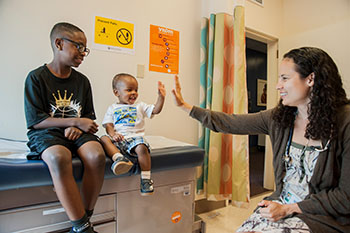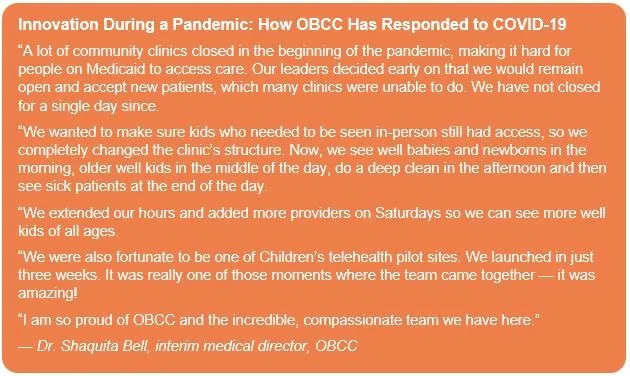Dr. Shaquita Bell Talks About the Future of Odessa Brown Children’s Clinic
March 3, 2021 | Author: Rose Ibarra, Seattle Children’s
When Dr. Shaquita Bell started working at Seattle Children’s Odessa Brown Children’s Clinic (OBCC) as a resident in 2006, she felt like she’d been transported back to her home in Minneapolis.
 “I identify as Black and Native (my dad is Black and my mom is Cherokee), and I wanted to work in a place where I could see myself and my family reflected, serving a community like the one I came from,” Shaquita says, “I found that at OBCC.”
“I identify as Black and Native (my dad is Black and my mom is Cherokee), and I wanted to work in a place where I could see myself and my family reflected, serving a community like the one I came from,” Shaquita says, “I found that at OBCC.”
When Dr. Ben Danielson left Children’s in November, Shaquita was appointed OBCC interim medical director. InHouse asked her about the recent leadership change, how she is addressing racism in healthcare and the future of OBCC.
How have you managed through this sudden leadership change and taking on a new role?
As we know, Dr. Danielson’s departure wasn’t planned and, to be honest, it was really hard. Ben was my teacher and mentor. He came to my wedding and spoke at my graduation. He inspired me to dedicate my life to antiracism work and was the leader of our clinic. Most of us were very surprised and I have observed feelings of hurt, sadness, loss and sometimes anger since his departure.
One of the hardest parts was having to quickly come up with a transition plan. When Ben left he was still on call and scheduled to see patients. I had to address all of that. It was overwhelming.
I really respect Ben, and I hope his actions lead to kids getting better care and addressing racism as a community. I hope there is growth in the work that we do, that we can meet more patients and families, and provide even more quality care with dignity — the very motto of our clinic.
How do you feel about the community’s response?
First, I want our community and families to know they’re going to get excellent care at OBCC because I honestly believe they will. Following Dr. Danielson’s departure, I heard from some patients and families who were worried about coming here for care. That concerns me, especially during the pandemic. I worry that some of the equity energy around this has been leveraged as criticism of OBCC.
The problems that have been raised are systemic and so complex. It’s going to take time to address them.
I’m a solutions-based person. I don’t just want to talk about what’s wrong, I want to talk about how to fix it. Our goal is to improve the health of our community overall, especially during a pandemic, and I don’t think we do that by making people question whether it’s safe to access healthcare. I want to inspire people to come together and build an even better, and healthier, future.
What would you say to families who have raised concerns about sending their Black child to OBCC or to Seattle Children’s Hospital?
First of all, we’d love to see you at OBCC. I will take care of you myself if I can! (the medical assistants and nurses always tease me because I say yes to every patient.)
I am confident you’ll get phenomenal care at OBCC. I sincerely believe we are a great clinic practicing great medicine.
In terms of our hospital, I would never hesitate to bring my own family there. I refer my patients there, many who are like family to me. The care that’s offered at Children’s is unparalleled to anything else in this region. I’m committed to helping Children’s improve but I still think it is the right hospital to seek care for your child.

How are you working to help Children’s become an antiracist organization?
I’m directing my energy at developing and implementing our Anti-Racism Organizational Change (AROC) strategic plan with other leaders in the Center for Diversity and Health Equity (CDHE) and Children’s executives. I believe there are tangible things we can do to improve the lives of children, become an antiracist organization and serve as a model for other healthcare organizations. It may sound like I’m “drinking the Kool Aid,” but I’m excited about it.
If you asked me 10 years ago if I’d be excited about a strategic plan, I would have rolled my eyes or fallen asleep. But now, I realize that having a strategic plan means there is accountability. It’s not a letter saying what happened to George Floyd is wrong, police brutalities are wrong or we don’t like racism. We’re going to address racism in healthcare in specific, timely ways with dedicated resources.
There are going to be hard conversations. Everyone in the organization is not going to agree with this plan and it may even cause some workforce members to leave the organization. That’s going to be hard. But, overall, it’s exciting to see this come to fruition.
As the interim director of OBCC, what do you say to your clinic’s team members?
I’m trying to put things in perspective. This has been a really hard transition in the midst of a pandemic, but we have each other, we have health, we have jobs. That’s so much more than a lot of the patients we care for. We see families who’ve lost loved ones to COVID-19, have lost jobs and subsequently their houses, or are struggling with online education and don’t have the job flexibility that we do at Children’s.
I’m trying to reorient us to the positive and remember the privileges we have. It is a privilege to work at OBCC and with our community there; we are not “saving” anyone, we are coming together to create a healthy generation that will hopefully one day take our place in this work. I’m also spending time listening and giving space for people, including workforce and community members, to talk about what has happened and what they want to happen.
What are your hopes for the future of OBCC?
One of the beautiful things about this situation is we get to have a new leader and a new perspective. This is an opportunity to ask: How do things work? How could they work better? What are we doing because it’s the way we’ve always done it and could we do it better? Thinking of innovation and making lives better gets people energized.
For example, I would love to help build a sickle cell destination center. Ours has always been a cutting-edge program with wrap-around services. I want to make it even larger by introducing research and education so we can teach others to care for patients with sickle cell.
Overall, I believe focusing on our patient families is the best way to move forward.
This article was published Feb. 25, 2021 in Seattle Children’s employee newsletter InHouse.